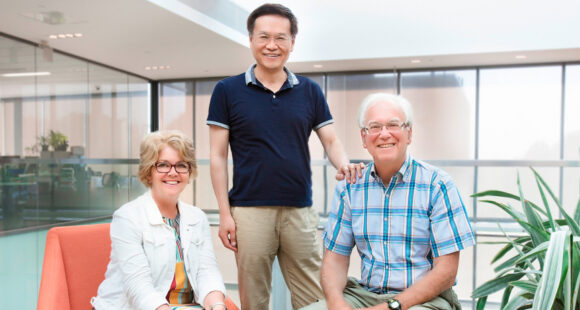Editor’s Note: This article first appeared in the Spring 2021 issue of Rutgers Magazine in the feature titled “Thinking Big”
Rutgers Big Ideas—an initiative of 12 bold projects with global implications—will draw on the university’s academic, health care, and research expertise to make the world a better place.
For more than 250 years, Rutgers has been reaching further, trying harder, and achieving bigger and better things. From the discovery of streptomycin, the first antibiotic used to treat tuberculosis, to the Rutgers Tomato, the university has given birth to bold projects that have made the world a better place.
These innovations didn’t appear by magic. If every great achievement begins with an idea, it is also true that those ideas require resources, collaboration, and organizational support. Rutgers has used these ingredients time and time again. And the university is continuing the tradition in the Big Ideas initiative.
In 2018, Rutgers issued a challenge to its 23,000 faculty and staff to produce their most imaginative, disruptive, and visionary proposals for inspiring widespread, equitable societal change. That challenge resulted in more than 200 collaborative ideas, ranging from cutting-edge cancer treatment to socially engaged art and sustainable urban farming.
Forty teams went on to pitch their large-scale, forward-thinking projects at a symposium on October 4, 2019. Hundreds of community leaders, philanthropists, and innovators gathered to learn more about how Rutgers was applying its intellectual power to serve the common good. They offered their input to guide what came next.
In 2020, as much of the world turned inward in the face of COVID-19, the Rutgers community continued to move the Big Ideas initiative forward. Rutgers chancellors and academic leaders at Rutgers University–New Brunswick, Rutgers Biomedical and Health Sciences, Rutgers University–Newark, and Rutgers University–Camden met repeatedly (and remotely) to discuss and refine the 40 proposals and incorporate feedback from the university community. President Jonathan Holloway reviewed the team’s recommendations and supported the vision and aspirations reflected in their choices.
From those deliberations emerged 12 Big Ideas that advance Rutgers’ status as a world-class university devoted to the greater good. Driven by faculty and researchers across disciplines, divisions, and locations, the 12 interdisciplinary projects hold the potential to address critical issues of our day, such as public health, climate resilience, social justice, access to education, microbiomes, and artificial intelligence.
“These Big Ideas have the capacity to improve the human condition,” says Holloway. “By leveraging Rutgers’ standing as an academic, health, and research powerhouse, our university is poised to lead the nation and world toward a more just and sustainable future. These projects could not come at a more critical time. At what may seem to be a dark hour in human history, Big Ideas promise to light a way forward.”
Gut Reaction
The Rutgers University Microbiome Program will examine the interactions among microbes and their hosts and the strong need for diversity in microbes that inhabit our bodies.

Maria Gloria Dominguez-Bello, Liping Zhao, and Martin Blaser are the leaders of the Rutgers University Microbiome Program. Photography courtesy of Rutgers University Foundation.
“Each of us is a microbiological ecosystem,” says Maria Gloria Dominguez-Bello, Henry Rutgers Professor of Microbiome and Health at the School of Environmental and Biological Sciences (SEBS). “And from what we have observed, we have lost microbiome diversity.” Given the critical role our gut bacteria play in our metabolism and in boosting our immunity to pathogens, like coronaviruses, and our ability to combat other diseases, the loss of microbiota variety, particularly at young ages, has led to many problems that scientists are still discovering.
“Because of modern life—sanitation, antibiotics, antibacterials—we’re changing the microbiome, and those changes have consequences,” says Martin Blaser, director of the Center for Advanced Biotechnology and Medicine. In other words, the lack of normal bacteria that are no longer present in our body is causing many chronic diseases. “The ways that we have been changing the development of a normal microbiome in early life has moved us out of health and into disease.”
The Rutgers University Microbiome Program aims to examine the microbiome’s role in human health, as well as in food systems, plants, animals, and the environment, all of which are undergoing severe diversity loss. The program will promote the preservation of microbiome diversity globally, develop novel solutions for restoring and maintaining healthy microbiota, and train students to be the next generation of physicians and scientists in microbiome research. It will also position Rutgers as an internationally recognized leader in microbiome research and accelerate the application of scientific discoveries to products and practices that improve human health. “Microbiome research can transform medicine, agriculture, the environment—altogether, it’s possible,” says Liping Zhao, the Eveleigh Fenton Chair of Applied Microbiology at SEBS.

